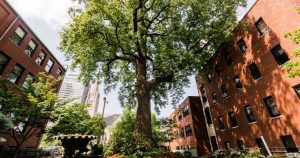Spalding University’s Festival of Contemporary Writing, the state’s largest fall-spring reading series, takes place this Saturday, May 25, through Friday, May 31, with faculty and alumni of Spalding’s low-residency Master of Fine Arts in Writing program.
The MFA program’s Distinguished Visiting Writer, Terese Marie Mailhot, delivers a public presentation on Thursday, May 30. She is the New York Times-bestselling author of Heart Berries, a powerful, poetic memoir of a woman’s coming of age on the Seabird Island Indian Reservation in the Pacific Northwest. Her book was also listed as a Best Book of the Year by NPR, Library Journal, the New York Public Library, and the Chicago Public Library and was one of Harper’s Bazaar’s Best Books of 2018. Mailhot is the winner of the inaugural Spalding Prize for Peace and Justice in Literature.
Festival events will be held at Spalding’s Egan Leadership Center and the Brown Hotel, as noted below. Plenty of free parking is available for the campus readings. All readings and events are free, ticketless, and open to the public.
5-6 p.m. Saturday, May 25. (Egan Leadership Center, 901 S. Fourth St.) Reading by Spalding President and MFA alum Tori Murden McClure, author of A Pearl in the Storm, which was released 10 years ago and which recounts her solo row across the Atlantic Ocean 20 years ago. A book signing will follow. Books available for sale until 2 p.m. at the Follett campus bookstore, which is located out the south door of the Egan Leadership Center.
5:15-6:15 p.m. Sunday, May 26. Faculty Reading. (Egan Leadership Center, 901 S. Fourth St.) Greetings by Associate Program Director Lynnell Edwards.
● Greg Pape (poetry), Four Swans: Poems
● Kira Obolensky (playwriting), Why We Laugh: A Terezin Cabaret
● Fenton Johnson (creative nonfiction, fiction), Everywhere Home: A Life in Essays; The Man Who Loved Birds
● Keith S. Wilson (poetry), Fieldnotes on Ordinary Love
● Leah Henderson (writing for children & young adults), One Shadow on the Wall
● Eleanor Morse (fiction), White Dog Fell from the Sky
● Kathleen Driskell (poetry), Blue Etiquette
5:30-6:30 p.m. Monday, May 27. Faculty Reading. Celebration of Recently Published Books by Faculty. Book signing to follow. (Egan Leadership Center, 901 S. Fourth St.)
● Elaine Neil Orr (fiction, creative nonfiction;), Swimming Between Worlds, Gods of Noonday: A White Girl’s African Life
● Lynnell Edwards (poetry), Covet
● Kirby Gann (fiction, creative nonfiction), Ghosting; John Knowles’ A Separate Peace: Bookmarked
● Minda Reves (Bachelor of Fine Arts director)
● Robin Lippincott (fiction, creative nonfiction), Our Arcadia; Blue Territory: A Meditation on the Life and Art of Joan Mitchell
● Julie Brickman (fiction), Two Deserts: Stories
● Larry Brenner (screenwriting, playwriting), Bethlehem; Saving Throw Versus Love
5:30-6:30 p.m. Thursday, May 30. Presentation by Distinguished Visiting Writer Teresa Marie Mailhot, author of Heart Berries: A Memoir. Book signing to follow. Books must be purchased prior to the event at the Follett campus bookstore, located at the south door of the Egan Leadership Center. (Egan Leadership Center, 901 S. Fourth St.)
● Terese Marie Mailhot, Heart Berries: A Memoir
3:30-4:30 p.m. Friday, May 31. Session I. Celebration of Recently Published Books by Alumni. Book signing to follow. Books provided by Follett Bookstore. (Brown Hotel, 1st fl., Citation Room, 335 W. Broadway)
● Teneice Durrant (poetry), Glass Corset
● Angela Jackson-Brown (poetry), House Repairs
● Mary Popham (fiction), The Wife Takes a Farmer
● Karen George (poetry), A Map and One Year
● Katerina Stoykova (poetry), Second Skin
4:45-5:45 p.m. Friday, May 31. Session 2. Celebration of Recently Published Books by Alumni. Book signing to follow. Books provided by Follett Bookstore. (Brown Hotel, 1st fl., Citation Room, 335 W. Broadway)
● Paul Ruben (fiction), Terms of Engagement: Stories of the Father and Son
● Alice Gorman (fiction), Valeria Vose
● Heather Wyatt (creative nonfiction), My Life With(out) Ranch
● Phil Cohen (fiction), Stories in a Flash
● Savannah Sipple (poetry), WWJD and Other Poems
● Flora Schildknecht (fiction), Megafauna: Stories and Screenplay
The reading schedule may change without notice. Check Facebook.com/SpaldingSchoolofWriting for updated information under the “Events” tab. For more information, call 502-873-4400 or email [email protected].
The School of Creative and Professional Writing at Spalding University offers three low-residency programs, including the flagship 65-credit-hour MFA in Writing Program; a 35-credit Master of Arts in Writing, offering tracks in creative writing and professional writing; and a 15-credit graduate certificate in writing, also with two tracks. The School of Writing offers concentrations in fiction, poetry, creative nonfiction, writing for children and young adults, screenwriting, playwriting, and professional writing. Students begin the semester in the spring, summer, or fall with a residency in Louisville or abroad, then return home for an independent study with a faculty mentor for the rest of the semester. Students may customize the location, season, and pace of their studies. See spalding.edu/schoolofwriting for more information, or find us on Twitter @SpaldingWriting.
